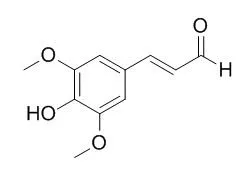METHODS AND RESULTS:
The antifungal effects of cinnamaldehyde, 4-hydroxy-3-methoxycinnamaldehyde (coniferyl aldehyde) and 3,5-dimethoxy-4-hydroxycinnamaldehyde (Sinapaldehyde) were investigated against 65 strains of Candida (six standard, 39 fluconazole-sensitive and 20 fluconazole-resistant). MICs of cinnamaldehyde, coniferyl aldehyde and Sinapaldehyde ranged from 100 to 500 µg ml(-1), 100 to 300 µg ml(-1) and 100 to 200 µg ml(-1), respectively. All tested isolates showed a marked sensitivity towards these aldehydes in spot and time-kill assays. Sinapaldehyde was found to be the most effective, followed by coniferyl aldehyde and cinnamaldehyde. At their respective MIC(90) values, the three compounds caused mean inhibition levels of glucose-stimulated H(+)-efflux of 36, 34 and 41 % (cinnamaldehyde), 41, 42 and 47 % (coniferyl aldehyde) and 43, 45 and 51 % (Sinapaldehyde) for standard-sensitive, clinical-sensitive and clinical-resistant isolates, respectively. Inhibition levels of H(+)-efflux caused by plasma membrane ATPase inhibitors N,N'-dicyclohexylcarbodiimide (100 µM) and diethylstilbestrol (10 µM) were 34, 45 and 44 %, and 57, 39 and 35 %, for standard-sensitive, clinical-sensitive and clinical-resistant isolates, respectively. Intracellular pH (pHi) was found to decrease by 0.34, 0.42 and 0.50 units following incubation with three tested aldehydes from the control pHi of 6.70. Scanning electron microscopy and transmission electron microscopy analysis was performed on a representative strain, C. albicans 10261, showing alterations in morphology, cell wall, plasma membrane damage and lysis. Haemolytic activity of the three compounds varied from 10 to 15 % at their highest MIC compared to an activity level of 20 % shown by fluconazole at 30 µg ml(-1).
CONCLUSIONS:
In conclusion, this study shows significant activity of cinnamic aldehydes against Candida, including azole-resistant strains, suggesting that these molecules can be developed as antifungals. |






 Cell. 2018 Jan 11;172(1-2):249-261.e12. doi: 10.1016/j.cell.2017.12.019.IF=36.216(2019)
Cell. 2018 Jan 11;172(1-2):249-261.e12. doi: 10.1016/j.cell.2017.12.019.IF=36.216(2019) Cell Metab. 2020 Mar 3;31(3):534-548.e5. doi: 10.1016/j.cmet.2020.01.002.IF=22.415(2019)
Cell Metab. 2020 Mar 3;31(3):534-548.e5. doi: 10.1016/j.cmet.2020.01.002.IF=22.415(2019) Mol Cell. 2017 Nov 16;68(4):673-685.e6. doi: 10.1016/j.molcel.2017.10.022.IF=14.548(2019)
Mol Cell. 2017 Nov 16;68(4):673-685.e6. doi: 10.1016/j.molcel.2017.10.022.IF=14.548(2019)